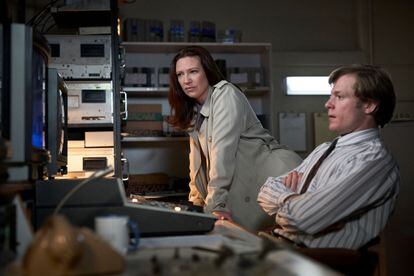The year is 1986, and the place is Australia.
Specifically, the writing of a national television news program in which nothing ever stops.
Because that's what happens with journalism.
That exists as a shadow of the world.
Like something that is always late but cannot not because things have to happen for them to become news.
It is that a bomb explodes in the center of the city, but also that the success of
Crocodile Dundee
- do not forget that we are in Australia, in 1986 - is filling the country with tourists.
And in that sense, due to its honesty and its anti-epic,
The Newsreader
(Filmin and COSMO) not only works as the reverse of the hypervitaminized
The Newsroom
of the always spectacularly intellectual Aaron Sorkin, but as the most modestly accurate portrait of the trade that consists of stepping on the heels of the world.
More information
Has 'The Newsroom' been a failed series?
The beginning of the series gives an idea of what the perpetual improvisation of the news consists of.
The deluded and passionate Dale Jennings (a Sam Reid afraid of not having enough talent), annoys part of a tape with Paul Hogan's statements and has to record a fake
stand up
—technical name of the pieces that a reporter introduces from the place of the news—before a handful of plants at the door of the chain, with the news already on.
The adrenaline of the moment, the frenetic —the presenters, the
newsreaders
, hence the title of the series, are giving rise to the news and Jennings is still inserting the video— it contains what makes journalism a kind of drug, what makes it the very center of the lives of the protagonists, since time, a powerful reason to forget about her.
Because in that race, Helen Norville, played by the always brilliant and magnetic Anna Torv, can afford to be the means and not the end.
The star presenter of
Noticias 6
can hide behind the screen and use her power, her enormous capacity as a communicator —the talent of the character is, within the humbleness of the format, from another planet—, to pretend that there is nothing beyond .
And the most valuable thing about her character is not so much the passion - which she shares with Jennings, in whom she sees a
possible successor.
, despite not having, like her, an innate talent for the matter—which she turns into the engine of her existence as the portrait of the fragility of mental health when it is subjected to a constant all or nothing.
But in her case it's also a necessary all or nothing, because Norville has only one lifeboat: herself at the table, on camera, reading the news.
Anna Torv and Sam Reid during a scene from 'The Newsroom'.
The intention of capturing how anxiety and neurosis coexist is evident, but the plot of this first, and well-executed season, at times excessively predictable, does not expand it but limits itself to having it, and relating it With frustration at the machismo that limits her space, she corners her —as a content-creating mind— and judges her without scruples, undermining a confidence that cannot be undermined because her life depends on it.
And yet, there he is, and his situation, even though it has also diminished in history compared to that of the male protagonist —and his repressed desire, and his forbidden relationship with a past that has become news: the HIV epidemic. in the 1980s—is really the only thing that matters.
While, as one of the characters puts it, "walking war zone," every rise and fall of Norville shakes up the newsroom.
Either because her partner at her table, feeling overshadowed and offside, knocks her down, or because the situation becomes unbearable.
And not so much because she represents them, but because she is the main victim of the true executioner of history: incompetence.
If the newsroom is a kind of ship on a stormy high sea, it is because it is in charge of the volcanic and inept Lindsay Cunningham (a superb William McInnes), a boss who, frustrated, tries to step on his editors instead of putting them on the spot. where each one of them deserves and wants to be, where they would shine and contribute the most.
Lindsay's inability to generously and empathetically lead the newsroom is at the very heart of a series that not only shows how talent — stifled — can be a curse.
Above all, she shows how the incompetence of a single person can end up destroying an entire team, and with it, each of its members, with nothing, fortunately, suffering.
Because that is what journalism is all about, that the journalist is never the news, that the journalist, and their problems, disappear under the front page headlines, which will not stop being front page headlines, no matter what happens.
You can follow EL PAÍS TELEVISIÓN on
or sign up here to receive
our weekly newsletter
.
Exclusive content for subscribers
read without limits
subscribe
I'm already a subscriber

